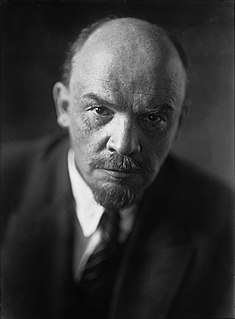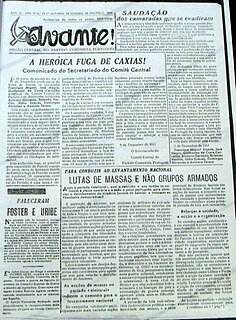| Look up Proletariat in Wiktionary, the free dictionary. |
Proletariat may refer to:
| Look up Proletariat in Wiktionary, the free dictionary. |
Proletariat may refer to:

Leninism is a political ideology developed by Russian Marxist revolutionary Vladimir Lenin that proposes the establishment of the dictatorship of the proletariat led by a revolutionary vanguard party, as the political prelude to the establishment of communism. The function of the Leninist vanguard party is to provide the working classes with the political consciousness and revolutionary leadership necessary to depose capitalism in the Russian Empire (1721–1917). Leninist revolutionary leadership is based upon The Communist Manifesto (1848) identifying the communist party as "the most advanced and resolute section of the working class parties of every country; that section which pushes forward all others." As the vanguard party, the Bolsheviks viewed history through the theoretical framework of dialectical materialism, which sanctioned political commitment to the successful overthrow of capitalism, and then to instituting socialism; and, as the revolutionary national government, to realize the socio-economic transition by all means.
A communist party is a political party that seeks to realize the socio-economic goals of communism. The term communist party was popularized by the title of The Manifesto of the Communist Party (1848) by Karl Marx and Friedrich Engels. As a vanguard party, the communist party guides the political education and development of the working class (proletariat). As a ruling party, the communist party exercises power through the dictatorship of the proletariat. Vladimir Lenin developed the idea of the communist party as the revolutionary vanguard, when the socialist movement in Imperial Russia was divided into ideologically opposed factions, the Bolshevik faction and the Menshevik faction. To be politically effective, Lenin proposed a small vanguard party managed with democratic centralism which allowed centralized command of a disciplined cadre of professional revolutionaries. Once a policy was agreed upon, realizing political goals required every Bolshevik's total commitment to the agreed-upon policy.

Trotskyism is the political ideology and branch of Marxism developed by Ukrainian-Russian revolutionary Leon Trotsky and by some other members of the Left Opposition and Fourth International. Trotsky self-identified as an orthodox Marxist, a revolutionary Marxist, and Bolshevik–Leninist, a follower of Marx, Engels, and of 3L: Vladimir Lenin, Karl Liebknecht, Rosa Luxemburg. He supported founding a vanguard party of the proletariat, proletarian internationalism, and a dictatorship of the proletariat based on working class self-emancipation and mass democracy. Trotskyists are critical of Stalinism as they oppose Joseph Stalin's theory of socialism in one country in favor of Trotsky's theory of permanent revolution. Trotskyists also criticize the bureaucracy and anti-democratic current that developed in the Soviet Union under Stalin.

Rosa Luxemburg was a Polish and naturalised-German revolutionary socialist, Marxist philosopher and anti-war activist. Successively, she was a member of the Proletariat party, the Social Democracy of the Kingdom of Poland and Lithuania (SDKPiL), the Social Democratic Party of Germany (SPD), the Independent Social Democratic Party (USPD), the Spartacus League, and the Communist Party of Germany (KPD). Born and raised in an assimilated Jewish family in Poland, she became a German citizen in 1897.

Béla Kun was a Hungarian communist revolutionary and politician who governed the Hungarian Soviet Republic in 1919. After attending Franz Joseph University at Kolozsvár, Kun worked as a journalist before the First World War. He served in the Austro-Hungarian Army and was captured by the Imperial Russian Army in 1916, after which he was sent to a prisoner-of-war camp in the Urals. Kun embraced communist ideas during his time in Russia, and in 1918 he co-founded a Hungarian arm of the Russian Communist Party in Moscow. He befriended Vladimir Lenin and fought for the Bolsheviks in the Russian Civil War.

Avante! (Onwards!) is the official newspaper of the Portuguese Communist Party (PCP). Founded in 1931, it continues to be published to this day. The newspaper's motto is Workers of the World, Unite! and has been present in every edition of the newspaper since the very first. Its headquarters is in Lisbon.

The Processo Revolucionário Em Curso (PREC) was the period during the Portuguese transition to democracy, which started after a failed right-wing coup d'état on 11 March 1975, and ended after a failed left-wing coup d'état on 25 November 1975. This far-left politics, labor movement-inspired period was marked by political turmoil, right-wing and left-wing violence, instability, the nationalization of companies and forcible occupation and expropriation of private lands.
Blanquism refers to a conception of revolution generally attributed to Louis Auguste Blanqui (1805–1881) which holds that socialist revolution should be carried out by a relatively small group of highly organised and secretive conspirators. Having seized power, the revolutionaries would then use the power of the state to introduce socialism. It is considered a particular sort of "putschism"—that is, the view that political revolution should take the form of a putsch or coup d'état.

In Marxist theory, a new democratic society will arise through the organised actions of an international working class enfranchising the entire population and freeing up humans to act without being bound by the labour market. There would be little, if any, need for a state, the goal of which was to enforce the alienation of labor. Karl Marx and Friedrich Engels stated in The Communist Manifesto and later works that "the first step in the revolution by the working class, is to raise the proletariat to the position of ruling class, to win the battle for democracy" and universal suffrage, being "one of the first and most important tasks of the militant proletariat". As Marx wrote in his Critique of the Gotha Program, "between capitalist and communist society there lies the period of the revolutionary transformation of the one into the other. Corresponding to this is also a political transition period in which the state can be nothing but the revolutionary dictatorship of the proletariat". He allowed for the possibility of peaceful transition in some countries with strong democratic institutional structures, but suggested that in other countries in which workers can not "attain their goal by peaceful means" the "lever of our revolution must be force", stating that the working people had the right to revolt if they were denied political expression. In response to the question "What will be the course of this revolution?" in Principles of Communism, Friedrich Engels wrote:
Above all, it will establish a democratic constitution, and through this, the direct or indirect dominance of the proletariat.

The ideology of the Communist Party of the Soviet Union (CPSU) was Marxism–Leninism, an ideology of a centralised command economy with a vanguardist one-party state to realise the dictatorship of the proletariat. The Soviet Union's ideological commitment to achieving communism included the development of socialism in one country and peaceful coexistence with capitalist countries while engaging in anti-imperialism to defend the international proletariat, combat capitalism and promote the goals of communism. The state ideology of the Soviet Union—and thus Marxism–Leninism—derived and developed from the theories, policies and political praxis of Lenin and Stalin.
People's democratic dictatorship is a phrase incorporated into the Constitution of the People's Republic of China (PRC) by Mao Zedong, the then Chairman of the Chinese Communist Party (CCP). The concept, and form of government, is similar to that of people's democracy, which was implemented in a number of Central and Eastern European Communist-controlled states under the guidance of the Soviet Union.
Revolutionary socialism is a political philosophy, doctrine, and tradition within socialism which stresses the idea that a social revolution is necessary in order to bring about structural changes to society. More specifically, it is the view that revolution is a necessary precondition for a transition from the capitalist mode of production to the socialist mode of production. Revolution is not necessarily defined as a violent insurrection; it is defined as seizure of political power by mass movements of the working class so that the state is directly controlled or abolished by the working class as opposed to the capitalist class and its interests.

In Marxist philosophy, the dictatorship of the proletariat is a condition in which the proletariat holds state power. The dictatorship of the proletariat is the intermediate stage between a capitalist economy and a communist economy, whereby the post-revolutionary state seizes the means of production, compels the implementation of direct elections on behalf of and within the confines of the ruling proletarian state party, and instituting elected delegates into representative workers' councils that nationalise ownership of the means of production from private to collective ownership. During this phase, the administrative organizational structure of the party is to be largely determined by the need for it to govern firmly and wield state power to prevent counterrevolution and to facilitate the transition to a lasting communist society. Other terms commonly used to describe the dictatorship of the proletariat include socialist state, proletarian state, democratic proletarian state, revolutionary dictatorship of the proletariat and democratic dictatorship of the proletariat.
Maoism–Third Worldism (MTW) is a broad tendency which is mainly concerned with the infusion and synthesis of Marxism—particularly of the Marxist–Leninist–Maoist persuasion—with concepts of non-Marxist Third Worldism, namely dependency theory and world-systems theory.
In the context of the theory of Leninist revolutionary struggle, vanguardism involves a strategy whereby the most class-conscious and politically "advanced" sections of the proletariat or working class, described as the revolutionary vanguard, form organizations in order to draw larger sections of the working class towards revolutionary politics and serve as manifestations of proletarian political power opposed to the bourgeois.
Anti-revisionism is a position within Marxism–Leninism which emerged in the 1950s in opposition to the reforms of Soviet leader Nikita Khrushchev. Where Khrushchev pursued an interpretation that differed from his predecessor Joseph Stalin, the anti-revisionists within the international communist movement remained dedicated to Stalin's ideological legacy and criticized the Soviet Union under Khrushchev and his successors as state capitalist and social imperialist.
Marxism–Leninism–Maoism (MLM) is a political philosophy that synthesizes and builds upon Marxism–Leninism and Maoism. Its proponents refer to Marxism–Leninism–Maoism as Maoism and Maoism as Mao Zedong Thought (MZT) or Marxism–Leninism–Mao Zedong Thought. Marxism–Leninism–Maoism was first formalized by the Shining Path in 1982.
A socialist state, socialist republic, or socialist country, sometimes referred to as a workers' state or workers' republic, is a sovereign state constitutionally dedicated to the establishment of socialism. The term communist state is often used synonymously in the West specifically when referring to one-party socialist states governed by Marxist–Leninist Communist parties, despite these countries being officially socialist states in the process of building socialism. These countries never describe themselves as communist nor as having implemented a communist society. Additionally, a number of countries that are multi-party capitalist states make references to socialism in their constitutions, in most cases alluding to the building of a socialist society, naming socialism, claiming to be a socialist state, or including the term people's republic or socialist republic in their country's full name, although this does not necessarily reflect the structure and development paths of these countries' political and economic systems. Currently, these countries include Algeria, Bangladesh, Guyana, India, Nepal, Nicaragua, Sri Lanka and Tanzania.

Permanent revolution is the strategy of a revolutionary class pursuing its own interests independently and without compromise or alliance with opposing sections of society. As a term within Marxist theory, it was first coined by Karl Marx and Friedrich Engels as early as 1850, but since then it has been used to refer to different concepts by different theorists, most notably Leon Trotsky.
Collectivist anarchism, also called anarchist collectivism and anarcho-collectivism, is a revolutionary socialist doctrine and anarchist school of thought that advocates the abolition of both the state and private ownership of the means of production, as it envisions the means of production instead being owned collectively, whilst controlled and self-managed by the producers and workers themselves. Notwithstanding the name, collectivist anarchism is seen as a blend of individualism and collectivism.